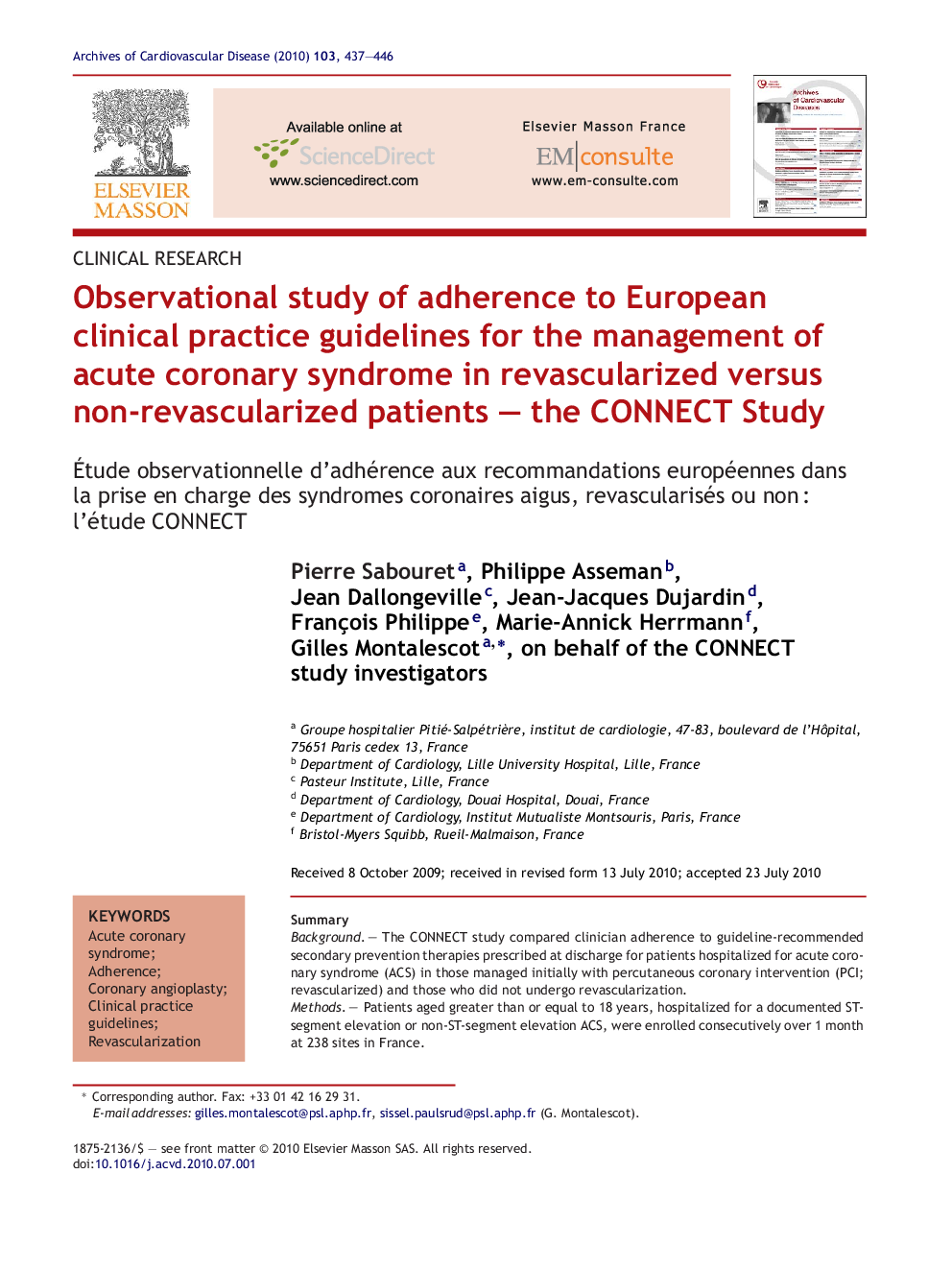| کد مقاله | کد نشریه | سال انتشار | مقاله انگلیسی | نسخه تمام متن |
|---|---|---|---|---|
| 2889496 | 1574391 | 2010 | 10 صفحه PDF | دانلود رایگان |

SummaryBackgroundThe CONNECT study compared clinician adherence to guideline-recommended secondary prevention therapies prescribed at discharge for patients hospitalized for acute coronary syndrome (ACS) in those managed initially with percutaneous coronary intervention (PCI; revascularized) and those who did not undergo revascularization.MethodsPatients aged greater than or equal to 18 years, hospitalized for a documented ST-segment elevation or non-ST-segment elevation ACS, were enrolled consecutively over 1 month at 238 sites in France.ResultsCompared with revascularized patients (n = 870), non-revascularized patients (n = 706) were significantly older, and a greater proportion were women, had high-blood pressure, type-2 diabetes or a history of atherothrombotic or cardiac disease, but a smaller proportion had a history of coronary angioplasty. On discharge, non-revascularized patients were prescribed beta-blockers, aspirin, statins, angiotensin-converting enzyme inhibitors or adenosine diphosphate receptor antagonists less frequently than revascularized patients. An adherence score greater than or equal to 80% (at least four of the five recommended agents prescribed at discharge) was found in 96.7% of revascularized patients and 74.4% of non-revascularized patients (P < 0.001).ConclusionsDespite a similar or even higher level of cardiovascular risk, non-revascularized ACS patients were prescribed guideline-recommended secondary prevention therapy less frequently than revascularized patients.
RésuméObjectifsL’étude CONNECT a comparé la prise en charge thérapeutique, à la sortie de l’hôpital au décours d’un syndrome coronaire aigu (SCA), des patients ayant bénéficié d’une revascularisation coronaire percutanée par rapport aux patients non revascularisés, au moyen d’un score d’adhésion aux recommandations européennes.MéthodesLes patients âgés d’au moins 18 ans, et présentant un SCA avec ou sans sus-décalage du segment ST, ont été inclus, de façon consécutive, sur une période d’un mois par 238 centres investigateurs français.RésultatsComparés aux patients revascularisés (n = 870), les patients non revascularisés étaient significativement plus âgés, plus fréquemment des femmes, et présentaient plus souvent des antécédents d’hypertension artérielle, de diabète de type 2, d’insuffisance cardiaque, d’insuffisance rénale, avec une moindre fréquence d’antécédents d’angioplastie coronaire. À la sortie de l’hôpital, les patients non revascularisés bénéficiaient moins souvent d’un traitement par bêtabloquants, aspirine, statines, inhibiteurs de l’enzyme de conversion (IEC), antagonistes des récepteurs à l’ADP par rapport aux patients revascularisés. Un score d’adhésion aux traitements BASIC supérieur ou égal à 80 % (au moins quatre traitements recommandés présents sur l’ordonnance de sortie) était observé chez 96,7 % de patients revascularisés et chez 70,4 % de patients non revascularisés (p < 0,001).ConclusionAlors même que leur niveau de risque était au moins équivalent sinon supérieur, les patients présentant un SCA et non revascularisés recevaient moins souvent à la sortie de l’hospitalisation les traitements validés par rapport aux patients revascularisés.
Journal: Archives of Cardiovascular Diseases - Volume 103, Issues 8–9, August–September 2010, Pages 437–446